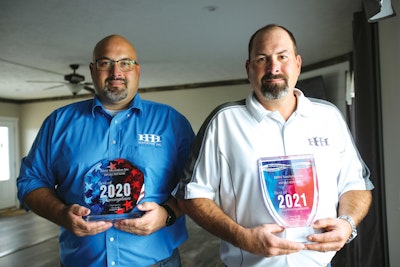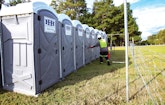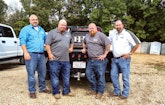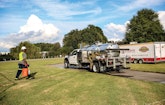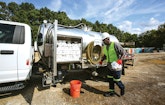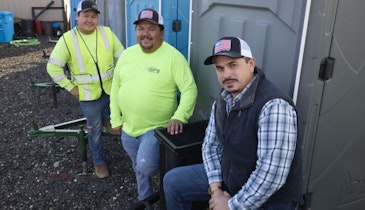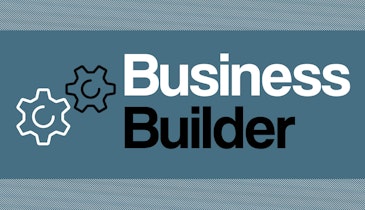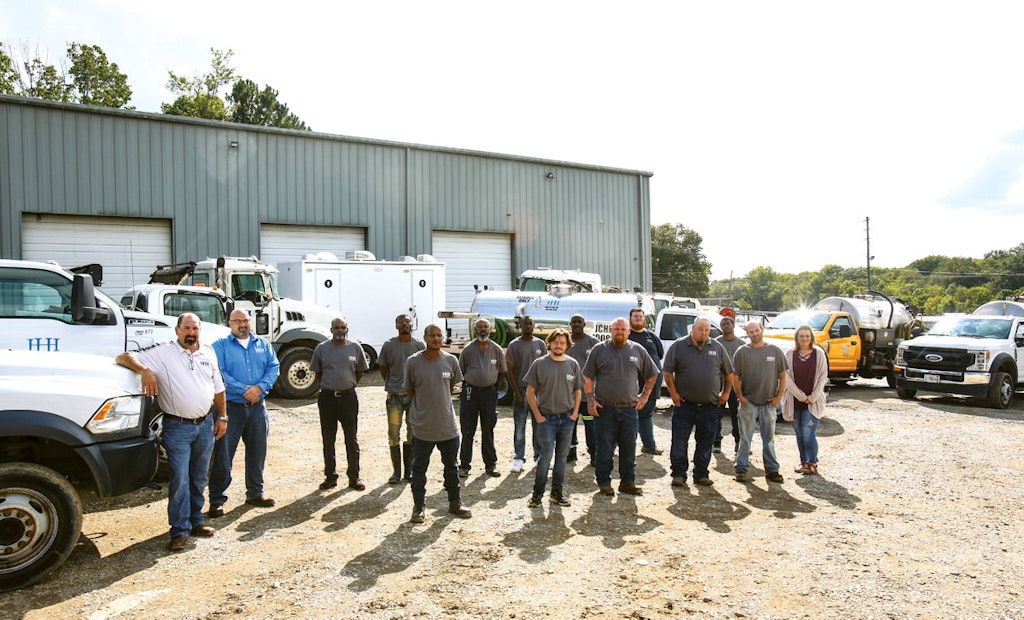
The HHH Sanitation team includes (front row, from left) Chris Hettich, Tim Hettich; Donnel Ford, Jake Franklin, Andrew Heidenreich, Brandon Abbott; and (back row, from left) Perry Banks, DeArreone Cook, Marvin Caddel, Horace Richardson, Earnest Glass, Trent Sweatt, Anthony Jones, Brad Sweatt, Leeanne Jackson. (Photos by Meg McKinney)
Brothers Chris and Tim Hettich both came to co-ownership of HHH Sanitation by different paths, but together their individual skills are proving a formidable force in growing this portable restroom rental and service operation in Birmingham, Alabama. Their secret: Accept what you can’t change, and make the best decisions to move forward.
More than 20 years ago their father, Randy Hettich — who was facing retirement — and his best friend, who ran a small portable restroom business, had been looking for a business to operate together. That opportunity arrived with a call from another restroom company offering to sell its Birmingham-area portable restroom division. A year later, they received a call from yet another company offering their area portable restroom operations for sale as well.
Tim joined the business in 2002 as a pickup and delivery driver.
“At that time I was working as a train conductor for Norfolk Southern between Birmingham and Atlanta,” says Chris. “Shifts ran every eight hours and I wasn’t happy with the time I was able to spend with family. My baby’s first words were ‘bye-bye daddy.’ I came to my dad and told him I would do whatever job was open to see if I liked the business.”
Chris was hired in 2003 and spent a year on the ground floor, maintaining the company’s more than 500 restroom units and helping with transportation and delivery.
“I enjoyed having a regular schedule, and I enjoyed the work,” he says. “Even though it involved a pay cut, I was at home with my family, which was more important than anything else.”
RECESSION-PROOF
In the years following, Chris moved into sales and then the role of general manager, as his brother was promoted to logistics manager.
Chris had also purchased a non-competing one-truck portable restroom business offering more than 200 units and serving contractors in the homebuilding industry, which he operated privately.
However, with the arrival of the 2008 financial crisis and a worsening economy, he considered going back to the railroad before committing permanently to his father’s business.
“My response to the recession was to become really creative,” he says. “I shifted our staff, cut overtime hours, and reorganized our route schedules and timelines and we rode the recession out without having to lay anyone off. That was the right thing to do, because in the service industry your people and their performance are the heart of your company.”
Chris merged his company with his father’s business the following year, even as his father’s business partner did the same with a business of equal size.
Following the recession, the business continued to grow. However, as Randy made plans to retire, he and his business partner agreed to divide the business between both families, so each could create its own legacy. That reorganization led to the establishment of HHH Sanitation in 2015.
“We still do business with each other and we’ve both prospered,” says Chris. “HHH has doubled in size over the last six years and we’ve grown to the same size as the company was before we divided the assets.”
THE INVENTORY
Today the company fields almost 2,000 portable restrooms: about 1,500 from PolyJohn; 260 from Satellite Industries; 120 from J&J Portable Sanitation Products; and 100 from Armal. Of those, 30 Satellites and 30 PolyJohns are ADA compliant.
They’re transported by a 2020 Isuzu flatbed that can handle 10 units; an 18-unit trailer from Liquid Waste Industries; and a 10-unit trailer by Outback Trailers. HHH has also built two custom trailers, an eight-hauler and a 12-hauler.
Larger restroom-equipped trailers include two eight-unit, one four-unit and one two-unit model from Satellite. HHH also offers an eight-unit model from Advanced Containment Systems and a seven-unit model from Comforts of Home Services.
HHH provides 85 hand-wash stations from PolyJohn, 10 from Satellite and 75 units designed and manufactured in its own shop. Deodorizers are supplied by Walex Products and J&J.
Among the company’s 10 vacuum trucks, eight are self-built, including: a 2007 Isuzu with a 600-gallon waste/250-gallon freshwater aluminum tank and Condé pump by Westmoor; a 2008 Chevrolet 3500 with a 200-gallon waste/50-gallon freshwater steel tank and Jurop/Chandler pump; a 2011 Dodge 5500 with a 450-gallon waste/400-gallon freshwater steel tank and Masport pump; a 2016 Dodge 5500, with a Lane’s Vacuum Tank 900-gallon waste/300-gallon freshwater steel tank and Masport pump; a 2016 Ford F-650, with a Lane’s 900-gallon waste/300-gallon freshwater steel tank and Masport pump; a 2017 Ford F-550 with Lane’s 1,100-gallon waste/300-gallon freshwater aluminum tank and Masport pump; a 2019 Ford F-750 with a Keith Huber (Hol-Mac Corporation) 1,100-gallon waste/300-gallon freshwater steel tank and National Vacuum Equipment pump; and a 2020 Ford F-550 with a Lane’s 1,100-gallon waste/300-gallon freshwater aluminum tank and Masport pump.
Additional vacuum trucks include a 2017 Ford F-550 built out by Lane’s with a 900-gallon waste/300-gallon freshwater steel tank and NVE pump, and a 2019 Ford F-550 built out by FlowMark with a 1,200-gallon waste/300-gallon freshwater aluminum tank and NVE pump.
HHH also owns 80 300-gallon holding tanks from Satellite.
DO WHAT YOU DO BEST
The brothers have prospered by sticking to their areas of expertise: Tim to managing logistics and Chris to sales and marketing. Increasingly, they’re relying on general superintendent Brandon Abbott, shop foreman Andrew Heidenreich, financial manager Melinda Hagood and coordinator Leeanne Jackson to handle on-the-ground duties.
About 80% of the business is serving construction clients. A roll-off waste container and disposal business complements the portable restroom contracts.
“We see construction as the business that carries us from day to day,” Chris says. “Our event money is used to grow the business and to invest in new equipment.”
HHH headquarters is located on five acres, which includes a four-bay service shop with overhead crane and welding shop.
“We do 90% of our own service work,” says Chris. “Anything that does not require a computer or HVAC is fair game. With the welding shop we can do anything from building tanks to assembling trucks. We tend to buy new trucks assembled, but typically a tank outlasts a truck, so we just set the tank on a new truck, put new PTOs and shafts on it, spec the truck the way we want and put it on the road.”
Examples of the custom fabrication include installing freshwater tanks on all delivery vehicles, so the water can be used for anything, including office fills on construction sites.
The Hettichs attend the WWETT Show every year to meet with their suppliers, learn about new products and upgrade their skills through continuing education sessions.
Area PROs are part of a supportive professional community. They rent equipment to each other, pump each other’s units and share event contracts, according to the brothers.
HHH advertises through Google and social media, but half of new business is earned through referral.
WE’RE GOING TO GROW
The brothers reckon they still have at least 25 good working years apiece in them, and are primed to continue taking HHH on its growth trajectory, adjusting their plan to account for unforeseen conditions.
Chris enjoys Family Feud host Steve Harvey’s analogy comparing the challenges of being successful to standing on the edge of a cliff, but never jumping off, using the parachute one has been given by education and experience.
“I think of business that way,” he says. “But you not only have to know that the parachute is good, but that you’ve left enough room for the parachute to deploy before you hit bottom. Once I’m convinced, I’ll jump.”
